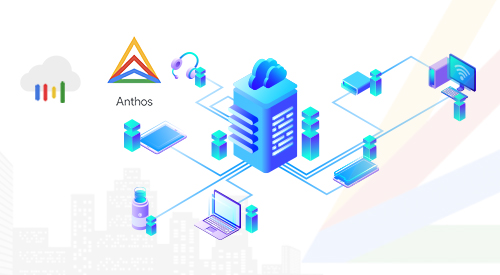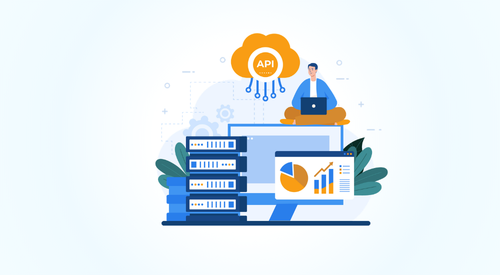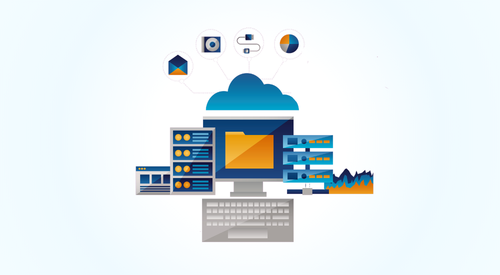

Businesses of today face a myriad of challenges. They have to juggle more tasks than ever at once, and it’s hard to address all problems at the same time, while ensuring that the different networks, systems administrators, and developers are all playing on the same team, working in coordination with each other. As hybrid clouds and multi-cloud architectures gain popularity among industries, more companies are relying on a select few cloud services to run backend applications. But managing and orchestrating multiple cloud services is complex. Managing these multiple cloud environments can become overwhelming if not handled by knowledgeable and experienced individuals. More often than not, businesses struggle with these challenges, opting for a re-configuration or reimagining of existing multi-cloud strategies. Here’s how hybrid & multi cloud environments are advantageous in posturing businesses to achieve more out of their cloud operations.

What Is Multi-cloud?
Multi-cloud is a type of cloud adoption strategy whereby organizations opt to use more than one Cloud service provider to meet their different cloud computing needs. For digital native businesses, leveraging cloud services is a core function of their business strategy. The modernization process for most digital native organizations begins with a single cloud, employing the cloud service provider that best suits their needs. However, more often than not, organizations begin to look for alternate options to avoid vendor lock-ins and to leverage better costs and offers with other cloud service providers. Building cloud agnostic assets then becomes key for digital native organizations to leverage the benefits of a multi-cloud approach.
What Is A Hybrid Cloud?
Hybrid cloud is a type of cloud adoption strategy where organizations modernize a portion of their assets partially with cloud, preferring to leave the rest in traditional on-premise servers. For traditional organizations that are not cloud-born, on-premise is where they would begin their cloud-journey. With organizations that are looking to migrate partially from on-premise to cloud, there are quite a few variable components including the servers, the virtual machines, and the networks that can be customized on cloud. To gain the best of an on-premise base as well as enjoy the benefits of cloud computing, traditional organizations often opt to take a hybrid approach to their modernization journey.
Advantages Of Hybrid Cloud & Multi-cloud
Hybrid-cloud management platforms enable developers to host and deploy their applications on-prem or in the cloud. For example, businesses operating in the healthcare and financial services industries often house their data as well as KYC applications locally while leveraging services provided by cloud computing to enhance customer experience with intelligent automation features (e.g. AI).
In the post-pandemic era that the world has found itself in today, companies are searching to find unique ways to deliver services and provide solutions within the restrictions of pandemic protocols. As workforces also continue to stay flexible in their remote locations, hybrid or multi-cloud services are being adopted alongside other unconventional technological approaches. As more and more organizations continue to become digital nomads and work remotely as opposed to relocating to a physical headquarters, companies have also begun to realize that they need to upgrade their technology, such as file storage solutions or collaboration tools for example, so that digital workers can access them from wherever they might be. This has been a major catalyst for the progression of cloud adoption, and hybrid / multi-cloud at that, across industries.
Enterprises that expand their landscape to either hybrid or multi-cloud environments, primarily look for better networking, storage and compute requirements, with a single management platform and consistent behavior from the applications hosted across the different environments. This makes a simplified management utility, a consistent journey across platforms, and a user-friendly application modernization plan, the need of the hour to address these challenges.
Anthos – Multi & Hybrid Cloud Management Tool
Anthos provides a single UI from which all clusters, whether hybrid or multi-cloud, can be monitored, managed and maintained. Unifying enterprise IT management with hybrid management software such as Anthos, brings a variety of benefits including easier monitoring, analytics, and compliance reporting capabilities which provide added value over multiple-point tools employed today. With multi-cloud approaches, a single pane of glass that can monitor different clusters, workloads, service mesh and the like, across environments, becomes easier to manage . On hybrid management, Anthos then lets you move them effortlessly between on-prem and cloud environments as needed. For example, when developing different aspects of your product you can choose whether to use an on-premise computing engine or to run them in the public cloud depending on which is most advantageous at any given time. And Anthos will facilitate both accordingly.
Hybrid & Multi-cloud Strategies – Points To Consider
Rapid spin up of cloud environments, owing to the easy and cost-effective services provided by cloud service providers, has resulted in a proliferation of environment clusters across business operations. As a result, it’s become increasingly necessary to ensure consistency of applications across different environments and ensure they’re being managed and observed consistently – which can prove challenging for developers.
Maintaining observability of applications over the different cloud services, each encompassing its own sets of tools and processes can be complex for devops teams within organizations. This creates the need for easy and simple assessment and access portals for the applications in any cloud environment.
Divided attention from the devops teams can also spell hindrances to growth for organizations. The teams that are meant to be focused on the applications- its maintenance, management and its security- can become embroiled in cloud service management and maintenance. This can be exceptionally difficult for developers who aren’t well versed in multi-cloud operations.
Anthos Implementation – Support, Pricing & More
At Niveus, we have been working closely with customers to provide critical support for Anthos. To know more about Anthos implementation, Anthos pricing, etc, reach out to us at biz@niveussolutions.com











